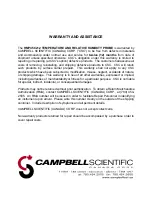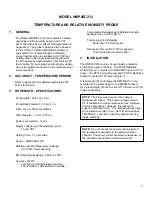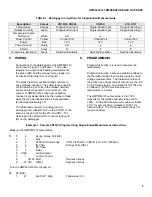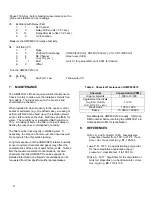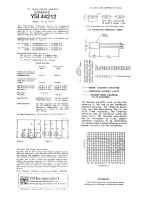
1
MODEL HMP45C212
TEMPERATURE AND RELATIVE HUMIDITY PROBE
1. GENERAL
The Model HMP45C212 probe contains a Vaisala
capacitive relative humidity sensor and a YSI
44212 thermistor as per attached documentation in
Appendix A. The probe is designed to be housed
in the 41002-2 12 Plate Gill Radiation Shield, or
equivalent; a ten foot lead length is standard.
Longer lead lengths are available up to 1000 feet.
Voltage drop in the longer lead lengths will lower
the RH reading by approximately 0.6% RH per 100
feet of cable. Do not extend lead lengths by adding
wire to the pigtail (connection) end or measurement
errors will result.
2. ACCURACY – TEMPERATURE SENSOR
Refer to Appendix A for details regarding the YSI
44212 thermistor.
3. RH SENSOR – SPECIFICATIONS
Probe length: 25.4 cm (10 in.)
Probe Body Diameter: 2.5 cm (1 in.)
Filter: 0.2 µm Teflon membrane
Filter diameter: 1.9 cm (0.75 in.)
Power consumption: <4 mA
Supply Voltage (via CSI switching circuit):
7 to 35 VDC
Settling Time: 0.15 seconds
Sensor: HUMICAP® 180
Relative Humidity Measurement Range:
0 to 100% non-condensing
RH Output Signal Range: 0.008 to 1 VDC
Accuracy at 20°C
±2% RH (0 to 90% Relative Humidity)
±3% RH (90 to 100% Relative Humidity)
Temperature Dependence of Relative Humidity
Measurement: ±0.05% RH/°C
Typical Long Term Stability:
Better than 1% RH per year
Response Time (at 20°C, 90% response):
15 seconds with membrane filter
4. INSTALLATION
The HMP45C212 must be housed inside a radiation
shield when used in the field. The 41002 Radiation
Shield (Figure 1) mounts to a CM6/CM10 tripod or UT10
tower. The UT018 mounting arm and UT12VA Radiation
Shield mount to a UT30 tower (Figure 2).
A lead length of 6 feet allows the HMP45C212 to be
mounted at a 2 meter height on a CM6/CM10 tripod.
Use a lead length of 9 feet for the UT10 tower or a UT30
tower respectively.
NOTE:
The black outer jacket of the cable is
Santoprene® rubber. This compound was chosen
for its resistance to temperature extremes, moisture,
and UV degradation. However, this jacket will
support combustion in air. It is rated as slow burning
when tested according to U.L. 94 H.B. and will pass
FMVSS302. Local fire codes may preclude its use
inside buildings.
NOTE:
Do not connect the power control lead and
the temperature excitation to the same excitation
channel. The power control will slow the response of
the excitation and result in temperature errors.



